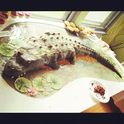Homemade caramel question: Every time I add vanilla extract at the end of the process, the entire batch instantly crystalizes. Why? What can I do?
How can I make caramels (for brittle, toffee, and other candies) without ruining their intended consistency with add-ins? Thanks!
6 Comments
sandyFebruary 9, 2019
I would like my caramels to have a longer shelf life. They are the recipe that uses sweetened condensed milk. What do companies that sell to stores use? Mine are great for a week-10days. Then they start to get grainy.
Leith D.December 29, 2015
You could use the seeds from a vanilla bean, but maybe try a different brand of extract. Buy real vanilla extract, not artificially flavored....maybe the artificial stuff has a higher % of water, which would cause the crystals you're seeing.
Shuna L.December 27, 2015
Hello Michelle,
Hmmm, this is quizzical. Although I *could* see this happening, I never have, (and I have ruined almost as much caramel as I have made.)
A few possible reasons why this is happening:
The vanilla extract is water, not alcohol based. The VanX is added when caramel has not reached end color. The VanX is added into caramel with a new utensil. The pan you're cooking caramel in is too thin, and so it's temperature is reducing more quickly that you may know. You are adding the VanX in after the caramel has cooled greatly.
And some questions to consider:
When you say the caramel crystalizes, do you mean it turns white and dry or that it seizes or that it hardens or that it separates?
And some hints:
Most vanilla extract is rendered ineffective if it is cooked. If I want the flavor of vanilla in something that's spending a lot of time on the stove (marshmallow, candy, ice cream/creme anglaise, custards etc.) I will use vanilla paste or steep vanilla beans. A little goes a long way.
Only white sugar will caramelize. Dark and light brown sugar will melt, but unless they are cooked or mounted with some kind of fat, they will not smooth out. I have even had some crystallization disasters with raw and organic sugars.
Cooking sugar will often crystallize if the pan is dirty in any way, or a tool is put into the sugar before it starts to color, or the heat source fluctuates, or the maker is daydreaming, or multi-tasking. Caramel prefers:
1. Constant & extremely high heat 2. a cooking vessel that is heavy and an amazing conductor of heat 3. its maker's Full Attention 4. everything that touches it to be super clean 5. to be made in a vessel at least three times its volume 6. additions to be mounted in on heat 6. to cool down at room temperature (hates being shocked in fridge or freezer).
Does any of this help? I really hope so. Making caramel at home means extra points for you! Please be careful - it is the absolute most dangerous thing in any kitchen - professional or otherwise.
Hmmm, this is quizzical. Although I *could* see this happening, I never have, (and I have ruined almost as much caramel as I have made.)
A few possible reasons why this is happening:
The vanilla extract is water, not alcohol based. The VanX is added when caramel has not reached end color. The VanX is added into caramel with a new utensil. The pan you're cooking caramel in is too thin, and so it's temperature is reducing more quickly that you may know. You are adding the VanX in after the caramel has cooled greatly.
And some questions to consider:
When you say the caramel crystalizes, do you mean it turns white and dry or that it seizes or that it hardens or that it separates?
And some hints:
Most vanilla extract is rendered ineffective if it is cooked. If I want the flavor of vanilla in something that's spending a lot of time on the stove (marshmallow, candy, ice cream/creme anglaise, custards etc.) I will use vanilla paste or steep vanilla beans. A little goes a long way.
Only white sugar will caramelize. Dark and light brown sugar will melt, but unless they are cooked or mounted with some kind of fat, they will not smooth out. I have even had some crystallization disasters with raw and organic sugars.
Cooking sugar will often crystallize if the pan is dirty in any way, or a tool is put into the sugar before it starts to color, or the heat source fluctuates, or the maker is daydreaming, or multi-tasking. Caramel prefers:
1. Constant & extremely high heat 2. a cooking vessel that is heavy and an amazing conductor of heat 3. its maker's Full Attention 4. everything that touches it to be super clean 5. to be made in a vessel at least three times its volume 6. additions to be mounted in on heat 6. to cool down at room temperature (hates being shocked in fridge or freezer).
Does any of this help? I really hope so. Making caramel at home means extra points for you! Please be careful - it is the absolute most dangerous thing in any kitchen - professional or otherwise.
hardlikearmourDecember 26, 2015
What's your recipe? Most caramels have ingredients to help decrease crystallization like invert sugar (often corn syrup), lemon juice or cream of tartar (to invert i.e. break the sucrose into glucose and fructose), as well as the fat from the cream and butter. Since you're getting crystallization when stirring in the vanilla, I suspect it is the agitation of the sucrose syrup that is leading to crystal formation. When I make caramels, I often stir in extracts as well as nuts and have no trouble. My recipes use corn syrup and cream of tartar, plus the cream and butter.
DonaDecember 26, 2015
I can't tell you why it happens, but my recipe for caramels calls for adding the vanilla to the cream and I've never had a problem.
DonaDecember 27, 2015
I should add, my recipe for caramels uses honey as the invert sugar. It's from Fine Cooking magazine, let me know if you want a link to the recipe.
Showing 6 out of 6 Comments
Recommended by Food52
Popular on Food52
Continue After Advertisement



